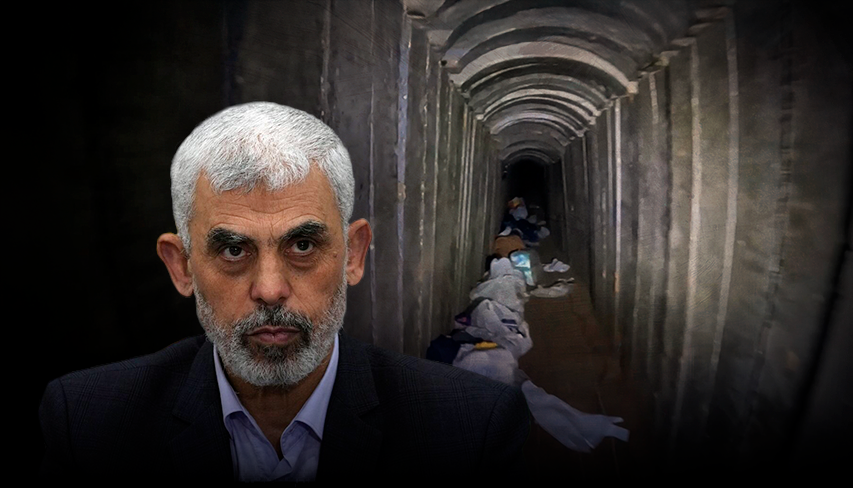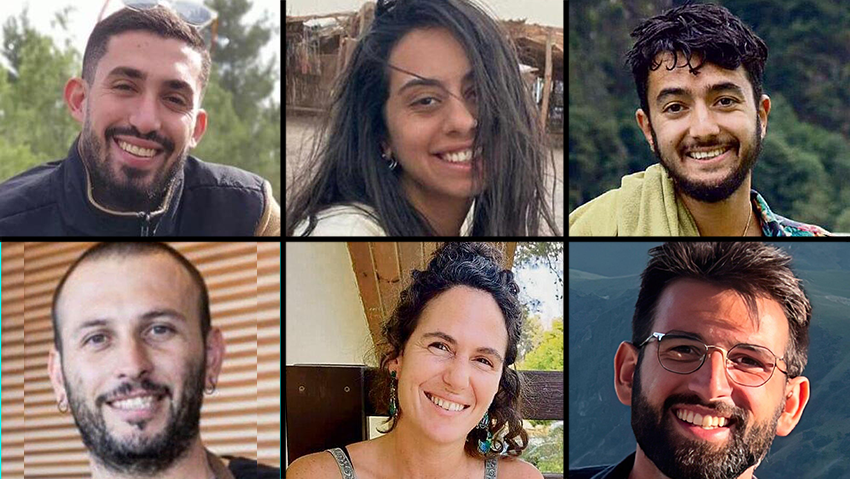Getting your Trinity Audio player ready...
In a recent discussion with IDF Chief of Staff Herzi Halevi, Israel placed a question mark over the fate of Hamas leader Yahya Sinwar. However, according to the New York Times, there is no evidence Sinwar has been eliminated. American officials have even speculated that the mastermind of the massacre is still alive, making "critical decisions" a year after October 7. While Israeli sources haven't confirmed Sinwar's elimination, they note there's no evidence of him being alive either.
The tunnel where the six slain hostages were held
(Video: IDF Spokesperson's Unit)
Washington believes Sinwar is intent on dragging Israel into a full-blown war amid the 3rd Lebanon war already underway, and thus has no intention of brokering a hostage deal. If still alive and tracking regional developments, Sinwar is likely encouraged by the direct exchanges of fire between Israel and Iran, pending Israel's anticipated response to this week's ballistic missile barrage. Despite this, it's reported that he is frustrated by what he perceives as inadequate support from Hezbollah and Iran.
American sources suggest Sinwar did not expect to survive the conflict. This belief, held by the Hamas leader in Gaza, who assumed the role of head of the organization’s political bureau after Ismail Haniyeh's elimination in Tehran, has disrupted indirect negotiations between Israel and Hamas, mediated by Egypt, Qatar, and the U.S. Sinwar not only survived but also gained additional "power" during the war.
The U.S. points out that while Prime Minister Netanyahu added conditions complicating the negotiations, Sinwar remains the primary obstacle to a deal that would bring back the 101 hostages held by Hamas for over a year. Recently, Hamas has shown no interest in talks that could renew negotiations, which stalled after the murder of six hostages in a Rafah tunnel.
Near the tunnel in Tel Sultan, where the bodies of Carmel Gat, Hirsch Goldberg-Polin, Eden Yerushalmi, Almog Sarusi, Uri Danino, and Alex Lobanov were found, signs of Sinwar's past presence were discovered. In a recent briefing, Defense Minister Yoav Gallant revealed that when Israeli forces entered the tunnels under Rafah, where the six were killed, "evidence of Sinwar's previous presence in the area was found." According to assessments, Sinwar realized forces were tightening the noose.
Earlier this week, Ynet reported that Israel bombed a tunnel complex weeks ago, suspecting Sinwar's presence. Sinwar, whether alive or dead, was not found in the tunnels during subsequent IDF searches. Since that bombing, Sinwar has been considered out of contact, at least according to Israeli intelligence. American intelligence suggests Sinwar believes a broader conflict in Lebanon might force Israel to scale back operations in Gaza. The conflict has indeed expanded but not in ways that "benefited Hamas," according to the Times.
Hezbollah joined the fray a day after the massacre, launching its first rocket into Israel on October 8 to "show solidarity" with Hamas. The Shiite militant group, according to assessments from both Jerusalem and Washington, did not initially seek a new war with Israel. However, the northern campaign has escalated over the past month.
It began with the explosions of pagers and communication devices, attributed to Israel according to foreign reports, and continued with the successive elimination of Hezbollah leaders, culminating in Secretary-General Hassan Nasrallah's airstrike death in Beirut about a week ago, ending his 32-year leadership. Israeli sources confirmed that on the night between Thursday and Friday, an airstrike in Dahieh targeted his intended successor, Hashem Safieddine, during a meeting of several Hezbollah leaders in an underground bunker.
Since then, assessments have increased that all attendees, including Hezbollah’s Head of Intelligence according to reports, did not survive the powerful strikes. Al-Arabiya reported last night that Israel received confirmation of Safieddine's elimination, though Jerusalem has not officially commented.
American officials now cite Hezbollah and Iran's failure to significantly harm Israel as a clear indication of Sinwar's miscalculation. If still alive, he remains isolated and hiding in Gaza's tunnels. According to the report, communication between Sinwar and the organization he leads has become "strained." Since the war's onset, he has communicated with operatives only through human messengers, sans any digital footprint.
"Sinwar is more focused on inflicting pain on Israelis than helping Palestinians," various intelligence agencies noted. Since Haniyeh's elimination last July, Sinwar's negotiation stance has hardened further. Haniyeh, seen by American officials as "more conciliatory," was interested in a deal and even "willing to forgo some of Sinwar's extreme demands."
If intense fighting persists and Iran becomes embroiled following a significant Israeli response to the ballistic missile barrage, Sinwar could "realize his dream." The White House views this possibility with concern, and President Joe Biden addressed Israel's expected response to the Iranian attack, which included launching over 180 ballistic missiles, stating that "Israel has yet to decide how to respond."






